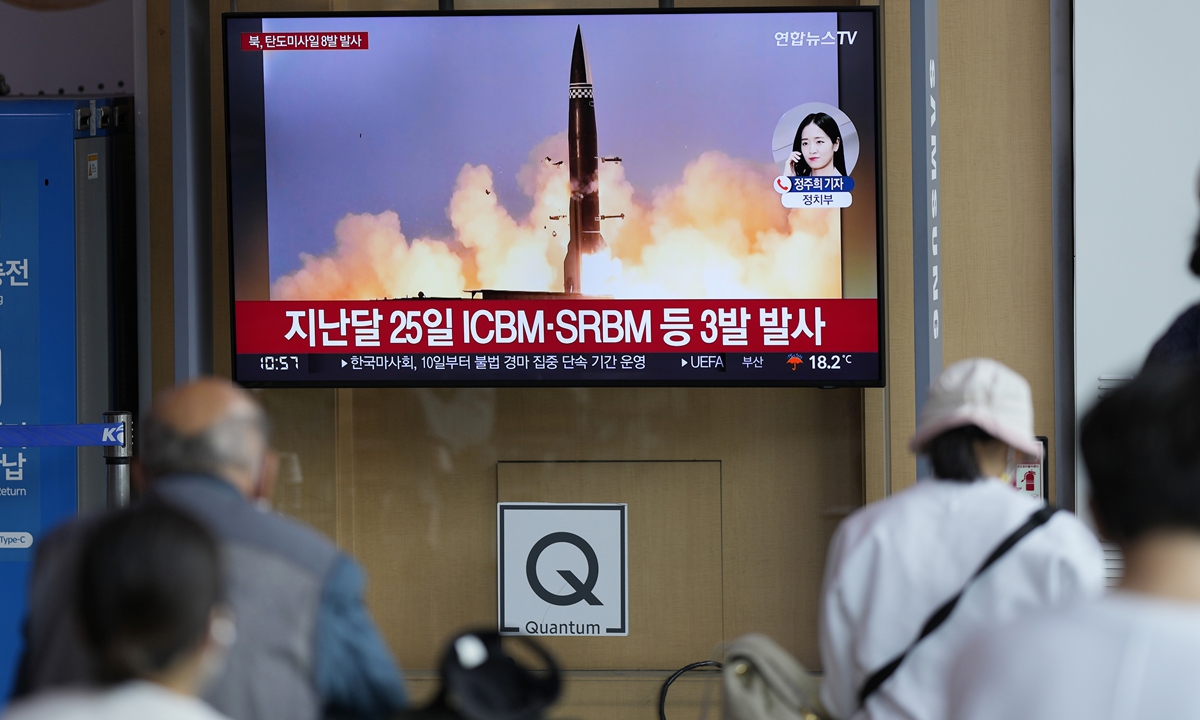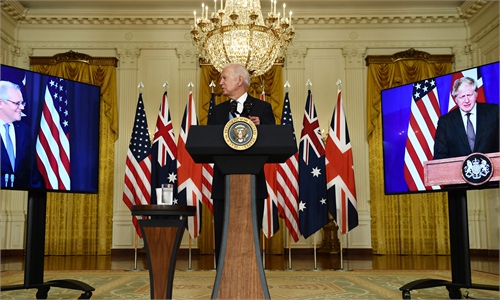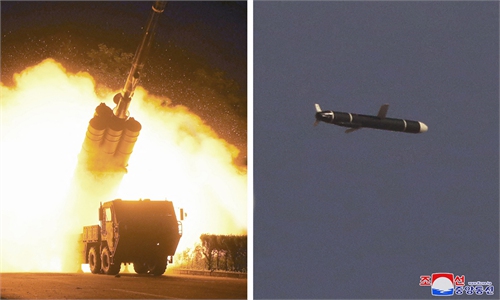
People watch a news report about North Korea's missile launch showing file images at a train station in Seoul, South Korea on June 5, 2022. Photo: VCG
By saying it is "fully prepared" for military conflict with the US and warning that the South Korean military would be "annihilated" in the event of "preemptive strike," North Korea has been showing a tougher tone recently following US and South Korea's intensive military exercises and verbal threats. Chinese experts urged the US and South Korea to ease military pressure on Pyongyang and respect its security concerns to avoid further escalation of tensions.
During a speech at a Wednesday occasion marking the 69th anniversary of the end of the Korean War (1950-1953), North Korea's leader Kim Jong-un said the country's military is "fully prepared" for crisis and military conflict, and the country's "nuclear war deterrence" is also fully ready to mobilize absolute strength faithfully, accurately and promptly to its mission," North Korea's official outlet the Korean Central News Agency (KCNA) reported on Thursday.
The Korean War broke out on June 25, 1950. On July 27, 1953, the warring parties signed the Korean Armistice Agreement at Panmunjom. North Korea marks July 27 as "Victory Day" of the Fatherland Liberation War.
Kim accused the US of committing the most serious harm to the modern history of North Korea in the past and fabricating the "threats" of North Korea nowadays to cover up its identity as an invader and push the Korean Peninsula into suicidal confrontation, according to KCNA.
Kim also sent a direct warning to South Korean President Yoon Suk-yeol for the first time that its military will face annihilation if they make any "dangerous attempt," referring to Yoon's military reinforcement plans, including building a Kill Chain preemptive strike platform.
On the special occasion commemorating the historical event, North Korea made a move which is a tough response to the military threats and pressure from the US and South Korea, Lü Chao, a researcher with the Liaoning Academy of Social Sciences, told the Global Times on Thursday.
Washington and Seoul have beefed up pressure on Pyongyang over the past three months. On May 3, US ambassador to the UN Linda Thomas-Greenfield called for further sanctions against Pyongyang over its missile tests at the UN Security Council, Reuters reported. During the NATO Summit in late June, North Korea was placed as a target by US, Japan and South Korea during their three-way meeting.
On June 4, the US and South Korea held their first combined drills involving aircraft carrier in more than four years. In early July, cutting edge US F35 stealth fighter jets teamed up with South Korean forces for the first time in a 10-day joint drill targeting Pyongyang, CNN reported. On July 22, Seoul said it would resume long-suspended live field training in joint exercises.
North Korea's voice is also a warning to the US and South Korea not to further inflame the situation on the Korean Peninsula, Da Zhigang, director of the Institute of Northeast Asian Studies at the Heilongjiang Provincial Academy of Social Sciences, told the Global Times on Thursday.
He said that although North Korea cannot match the US and South Korea in terms of conventional weapons, it believes it has reliable defense forces, especially nuclear capabilities.
Experts said it cannot be ruled out that the situation on the Korean Peninsula could heat up dramatically or even get out of hand. North Korea may launch new weapons tests and military drills in response.
The responsibility for the possible escalation of tension on the Korean Peninsula lies entirely with the US, Lü stressed.
"The US has only paid lip service to its willingness to unconditionally negotiate peace with North Korea, but it has yet taken any concrete actions," he said. "The US is actually trying to put the full responsibility of triggering the conflict on North Korea, which is a conspiracy."
The expert said that if the US and South Korea really want to de-escalate the situation on the Peninsula, real sincerity needs to be seen. For example, future US-South Korean military drills should be reduced in scale, which could be seen as a sign of sincerity.
The tough response from the US and South Korea will not bring North Korea back to the negotiating table, but only cause escalating antagonism and confrontation, which is not conducive to maintaining an atmosphere for diplomatic negotiations, Da said.
Different sides have different demands, and North Korea's legitimate security concerns and geopolitical interests should be respected," he said.
As for China's role, Da believes Beijing could be a constructive mediator, a promoter of peace and a defender of stability.
On Tuesday, China's special representative on Korean Peninsula Affairs Liu Xiaoming spoke by telephone with Kim Gunn, Special Minister for Korean Peninsula Peace and Security Affairs of South Korea's Foreign Ministry at their request. Liu called on all parties to exercise restraint, and address their respective concerns in a balanced manner.
Kim said Seoul attaches importance to China's important role on the Peninsula issue and is willing to strengthen communication and cooperation with China.



